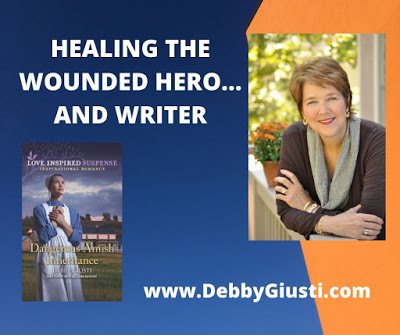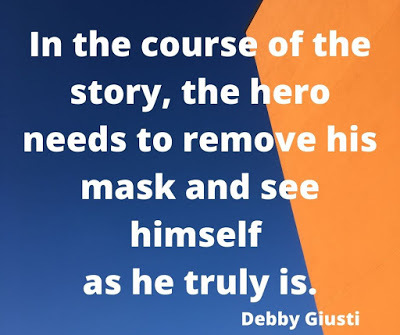Healing the Wounded Hero…and Writer

By Debby Giusti
Long ago, I attended an in-depth workshop sponsored by my Georgia Romance Writers’ chapter that dealt with story construction and character development. The speaker presented many ideas, but the takeaway that has stayed with me over all these years was her mention of a wound occurring in the hero’s youth that adversely affects him throughout life. She claimed adding such a wound would enhance the emotional impact of our stories.
Screenwriting consultant Michael Hauge uses a similar concept in his novel writing workshops. According to Hauge, the often misperceived comment or action— either overheard or occurring in childhood—is accepted by the hero as truth and perpetuates a feeling of low self-worth, thus forcing him to mask his true identity, which he believes is flawed. The mask is how the hero wishes to be perceived as he hides his authentic self from others and, sometimes, even from himself. Within a compelling story, the hero’s internal journey moves from what Hauge terms the hero’s identity, or the false mask he wears, to his essence or true self. The transformation to wholeness and acceptance of self provides an emotional punch that keeps the reader turning the pages.
I often create an internal wound for my heroes and include their journey to authenticity in my own stories. When working with the writing class I host, I encourage those attending the various sessions to include that inner journey as they brainstorm their stories. The hero’s wound should be specific and something the character can recall in time and place. For example, instead of saying the hero has always felt inferior to his younger brother, the writer should pinpoint an incident when the father praised the older child and maligned the younger sibling. The words should still reverberate in the younger brother's mind and underscore what he—the hero of the story—has accepted as truth since that time.

The hero might recount the following memory: “My father was proud of my older brother and said that very thing when he praised him for winning first place in the elementary school science fair. Conversely, Dad has always been embarrassed by my own less than stellar academic achievement and inability to succeed, which is what happened when the judges tried to make my experiment work at that same science fair. The audience laughed at my incompetence when the project literally fell apart on stage. At home that night, my father talked about his own mortification over my failure and called me a dummy who would never make anything of my life.”
With that false-truth ingrained in the hero, he can approach life in a number of ways. (1) He might try to win his father’s love and respect that continue to seem unattainable, thus perpetuating that sense of failure. (2) The hero could be lackadaisical about life and never attempt to achieve anything of worth, thinking he is incapable of being successful. (3) Or he could constantly compete with his brother, or other peers, and never establish healthy relationships that allow him to let down his guard and show his true self.
In the course of the story, the hero needs to remove his mask and see himself as he truly is. Perhaps he recognizes his own giftedness in an area he never gave himself permission to pursue, thinking it would not earn his father’s respect. His relationship with his father might begin to heal as father and son try to right the wrongs from the past. Even a hint of acceptance from his father could provide the first step to reconciliation. The hero could realize how he brought many problems upon himself, like a self-fulfilling prophecy, with his own fear of failure.

The hero has a new awareness of his own self-worth, he is able to forgive his father and/or his brother. Even more important, he forgives himself. If the wound has caused him to turn his back on the Lord, he can ask God’s forgiveness as well so that at the end of the story he is able to embrace life to the full. In my mind, that journey to wholeness provides a satisfying resolution to the stories I read…and write.
The hero’s journey applies to our own lives as well. If something is holding you back, if you see yourself in a less than flattering light, if you feel inferior or if you fear allowing others to see your authentic self, you—just like the characters in a story—may have an unresolved wound from the past. Through prayerful self-analysis, the wound can be revealed. Often something less specific comes to mind at first, but I suggest digging deeper and working to uncover the initial hurtful incident when the false sense of self began.
As Christians, we know Christ longs for us to live life to the full. Exploring the memory with Christ can provide healing. The Lord never uses harsh words or hateful criticism, instead he speaks lovingly and encourages us to accept the gifts and abilities he has given us. Revisit that painful situation but allow the Lord to speak positive words of affirmation and love. If you hear chastisement, such as if your father called you stupid, listen to the Lord say that you are wonderfully and beautifully made in his image and likeness and that you are a child of God.

Healing comes to our heroes at the end of our novels and usually in one fell swoop. In life, healing is a slow process that takes time. The wound often needs to be revisited over and over again until we can see clearly the fallacy of the pain-inflicting words and/or actions and come to recognize our own unique self-worth.
I hope you can use the wounded hero’s journey to wholeness in your own stories. I also hope you find release from any past pain with which you struggle as you discover your authentic self and your amazing giftedness.
Have you used the hero’s journey in your own stories or do you recall reading a book that successfully incorporated the technique? Leave a comment to be entered in a drawing for a copy of my Publishers Weekly Bestseller Dangerous Amish Inheritance.
Happy writing! Happy reading!
Wishing you abundant blessings,
Debby Giustiwww.DebbyGiusti.com
 Amish Christmas SearchOct 2020
Amish Christmas SearchOct 2020An Amish girl’s disappearance is a mystery…and the clues lead straight into danger at Christmas.
Convinced her friend didn’t run away as the police believe, Lizzie Kauffman searches for the truth—but someone will kill to keep it hidden. Now the Amish housekeeper and her friend Caleb Zook are on the run for their lives. And if they want to find their missing friend, Lizzie and Caleb must figure out a way to survive the holiday.
Pre-order HERE!
Published on July 14, 2020 21:00
No comments have been added yet.



